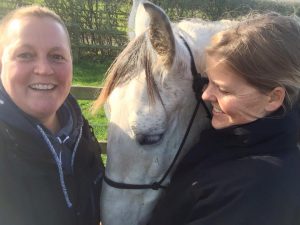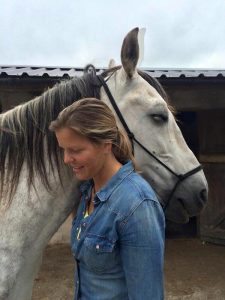Written by Lara Just – April 2016…
We have recently started a new project to be added to ADADSU: Equine Assisted Psychotherapy and Leadership Coaching. We are so excited about its potential having just witnessed most transformative changes among therapists and other mental health professionals on recent training days. This innovative and efficient way of working will soon be part of our services on offer, so stay tuned!
Why Horses?

Equine Assisted Somatic Intelligence (EASI) Programmes
Though other animals have been utilised to facilitate psychotherapeutic work, horses are unique as they are herd and prey animals. As such they are very attuned to their surroundings and are able to pick up the subtlest energies in the herd and in the environment, crucial to their survival out in the wild.
Because of this ability, they can be very affected by energies (positive or negative) and immediately reflect this through their body language and their behaviour. This can be very useful in the psychotherapeutic work, where the emotional or mental state of mind of the client can be picked up by the horse and mirrored back. This is helpful as it can point out unresolved issues and areas that require further work. It is this ability that can reduce the time spent in the usual way of talking therapies, where many resistances and defences come into play.1
In the workplace, for teamwork and leadership coaching, horses can be equally effective at exposing common problems or weaknesses within the team dynamics. Is the team leader effective at having willing followers that create efficient and effective teams which people are happy to be a part of? Are the team members rebellious or finding it difficult to trust in the abilities or congruence of the team leader? Are there other challenges within the team dynamics? The horses can show, with astounding clarity and in a gentle non-judgemental way, where the issues lie. This allows for a more positive way to approach change and improvement to help teams become more effective and productive when working together.2
How Does it Work?

Lara with her horse Rio
There are various ways of working with clients that involve the horse or horses in the therapeutic process. This can be by way of specific exercises that help streamline, as well as provide structure to the creative unfolding and the emergent nature of the experiential process.
For example, one of the exercises we were asked to do was to choose a horse that would accompany us through our “life journey”. There were different obstacles in the outdoor arena that were to represent key obstacles we had experienced in our lives. This reminded me of aspects from Gestalt therapy work or Time Line Therapy techniques used in NLP.3 A second horse was also a part of the process and was loose and free to interact in the process at any time. The aim of not interpreting but using all our senses and the horses’ behaviours to observe what happens in the here-and-now, often serves as metaphorical representations of our thoughts, emotions, memories and behaviour patterns with the ability to create meaning for each individual. This multi-dimensional metaphorical experiencing reminded me of my Clean Language4 and metaphor therapy training, just without the additional aspect of utilising the subtle wisdom of horses. To some extent, utilising additional participants (in this case horses) in the process also reminded me of Family Constellations work, which comparatively seems a little harder and more complex to do with humans, due to the added projections and resistances that are possible to interfere in the flow.5
For me, the overall experience was extremely powerful and emotive. Though it was not surprising which areas showed up for me, it was the emotional charge and strength that surprised me. This was particularly enlightening as I thought that some of these areas had already been dealt with in my own regular therapy. As psychotherapists we are encouraged to be in therapy not only as part of our training but also to ensure we continue to remain effective therapists for our clients. It made me aware of some of my own potential blind spots, the strength of existing resistances and how to utilise subtle embodied wisdom more intuitively. I saw many images and symbols in my mind’s eye that evoked strong feelings and this seemed to coincide with the horses’ behaviour in a very metaphorical way.
Leigh Shambo explains this type of experience in neuroscientific terms, with its similarity between our human emotional brains and that of a horse’s brain. Horses can be incredibly adept in mirroring our true underlying emotions, and as a result, it is difficult to hide our fears and pretences, therefore non-judgementally encouraging us towards more congruence and authenticity with ourselves. Because this type of learning is fully experiential, neural connections and pathways can be newly established integrating this knowledge in an embodied way. It is thought that this allows for a faster intuitive ‘recall’ of this learning that is then transferable into our day-to-day lives. This in turn can create more sustainable and effective positive change.6
What we found most extraordinary was not just our own personal and emotional responses to the work with the horses, but also those of the witnessing group. Even though we were a group of seven strangers, we were all very touched and resonated deeply with each other’s experiences with the horses.
Where to Find Good Training?
There are currently limited training providers in the UK and we have managed to review a few. It is difficult for mental health professionals to choose the right training, since this type of work is still relatively new and not yet regulated. We feel that LEAP in the UK provides a very professional, safe and contained environment, while also having the mental and physical wellbeing of their private herd at the heart of the therapeutic work.7 They are endorsed by and are an organisational member of The British Association for Counselling & Psychotherapy (BACP) and adhere to the BACP Code of Ethics.
The other already well established international association that provides a well-respected and structured training certification programme is the Equine Assisted Growth and Learning Association (EAGALA)8 and Pointon published an article about her experience of a UK course in 2005.9
What’s Next?
We are excited to start the full certification course later this year bringing this additional innovative service to ADADSU. Since the emotional and physical health and welfare of our horses is paramount to us, we are currently in the process of finding land that allows for the most natural environment and living conditions for the herd. We are looking to collaborate with experts in the field to make this a sustainable as well as a best practice centre utilising and contributing to latest research in the field. We will keep you updated of our progress – so do stay tuned or contact us for more information.
If you like to find out more and read about other benefits of equine therapy visit us here and also see our other blog post: 7 Top Reasons Why Horses Can Change Your Life
References
- Sudekum Trotter, K. (2012). Harnessing the Power of Equine Assisted Counseling: Adding Animal Assisted Therapy to Your Practice. USA: Routledge.
- Kohanov, L. (2013) The Power of the Herd: A Nonpredatory Approach to Social Intelligence, Leadership, and Innovation. California: New World Library.
- Wake, L (2008) Neurolinguistic Psychotherapy: A Postmodern Perspective (Advancing Theory in Therapy). London: Routledge.
- Clean Language & Metaphor Therapy: http://adadsu.com/glossary/#clean_language
- Liebermeister, S.R. (2006) The Roots of Love. Cambridge: Perfect Publishers Ltd.
- Shambo, L. (2013) The Listening Heart: The Limbic Path Beyond Office Therapy. USA: Human-Equine Alliances for Learning Heal.
- LEAP www.leapequine.com
- Equine Assisted Growth and Learning Association (EAGALA): http://www.eagala.org/
- Pointon, C. (2005) Horses for Courses. Therapy Today. September 2005, Vol. 16(7)
- Banning, N. (2012) When the Therapist is a Horse. Therapy Today. March 2012, Vol. 23(2): 14-18.
- Published Peer Reviewed Journal Articles: http://www.eagala.org/Research/Published_Peer_Review_Journal
- Counselling Directory on Equine Assisted Therapy: http://www.counselling-directory.org.uk/equine-assisted-therapy.html